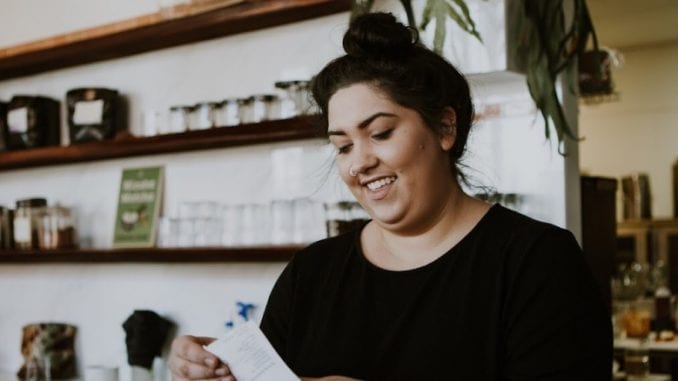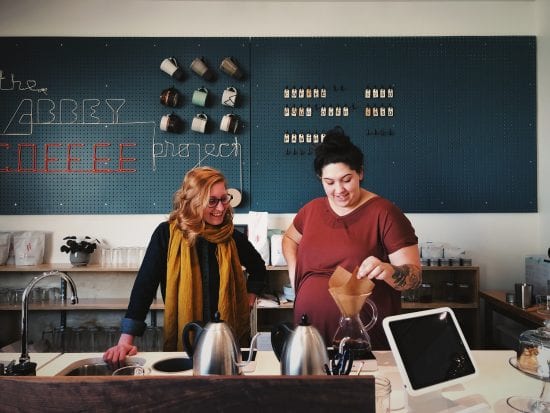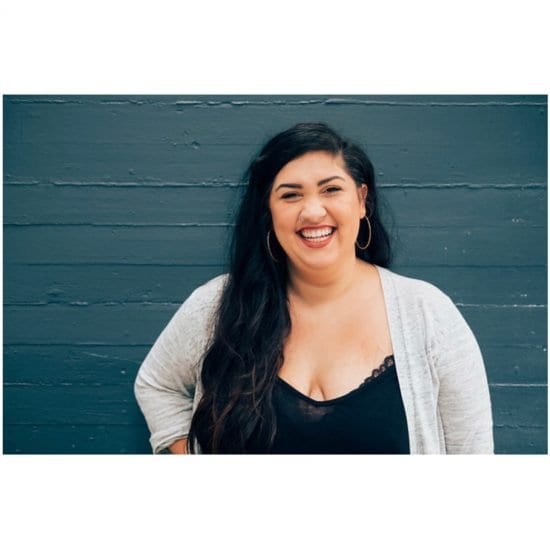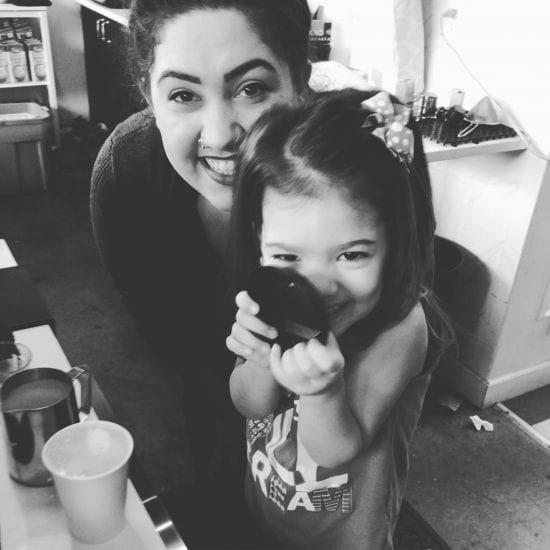
In part two of our interview with Erica Escalante, we talk money, servant leadership, and what it means to leave a legacy.
BY ASHLEY RODRIGUEZ
BARISTA MAGAZINE ONLINE
This is part two of our interview with Erica Escalante, owner of The Arrow Coffeehouse in Portland, Ore. We encourage you to jump back to part one before diving in!
Ashley Rodriguez: Let’s jump back into the topic of diversity—what other ideas are on your mind when it comes to opening or operating a coffee shop while being Latinx?
Erica Escalante: I wonder oftentimes about the financial backing of shops and how color/culture plays into that. I was not raised with money. My parents don’t have money. My family didn’t know anything about owning and running businesses. When I got started, I didn’t even know how investors work, let alone how you tap into that. I often call my shop a “grassroots” type of place. What you see is what you get and there wasn’t a ton of money involved in this process. I literally had to finagle and just use what I had and grow it over time. I see a lot of white folx able to open these super amazing cafés that probably cost them over $100K easily, if not a half million dollars, and I’m just like, “How could I even compete with that??”
I would talk to other café owners and found out they got their start because their parents loaned them $40K, or they had this investor, or some kind of trust fund, and I felt like, “Whoa, I’ve never had that amount of money at one time ever.” I love talking with other minority café owners about money, because it seems like we usually have the same kinds of stories. We can talk about our struggles and we talk about not being able to afford fancy equipment. We didn’t come from financial privilege or oftentimes financial literacy, and we’ve just had to learn as we go.

I do feel I’m making a larger generalization here, but out of my experiences, I can only think of a few exceptions. Now that I’ve been in it for a while, I’ve gained so much more financial wisdom. Opening my second shop was so much different than my first.
Overall, it’s been so life-giving connecting with other POC in general in the coffee community. There are times I feel so discouraged and text one of them saying something like, “What the heck am I doing here? I don’t belong here,” and it’s really them saying “YES YOU DO” that helps keep me going. They help validate who I am and my feelings about the experiences that I’ve had.
Knowing how representation inspires more and more POC to believe in themselves, feel comfortable, and show up, I try to go to all the events I can, judge whenever asked, speak at events when asked, and to show my face. I also always support my POC friends in their businesses and their social media platforms. I need to promote them as much as I can, and I hope that makes a difference.
AR: Talk about your management style. In Keys to the Shop, you talk about servant leadership, and I think it’s important to talk openly about how to be a kinder, more effective leader.
EE: I think becoming an employer can so easily suck the humanity out of you. There is so much liability involved, so much stress, so much risk, so much personal effort. I remember before I became an owner I always wondered why bosses weren’t better or nicer or more reasonable, and now that I’m here, it is hard! Truly—there are so many ways to get bitter. We are constantly told by our lawyers and in business seminars that we have to have these strict policies and procedures. We have to enforce them. “Document everything!!” “Hire slow, fire fast” … It’s all about protecting yourself and your livelihood and your position, and it’s mostly self-focused.
Now, think about trying to have a good relationship with anyone while trying to completely protect yourself? Doesn’t really add up. Yes, policies are necessary. Procedures and documentation are necessary. To me, what is just as important as those things is to have good relationships with people and to really care about the people around me. All good relationships take work. They take vulnerability. They take hard conversations. They take good healthy boundaries and very clear expectations. We can do our best to have solid systems in place, but if we take the humanity out of those systems, then we oftentimes miss out on having happy endings and resolutions to problems.

There is a TED Talk that truly has inspired me and was formative in my leadership style called “On Doing Dishes & Bureaucracy.” Every leader should watch it.
AR: How do you think being a mother affects the way you view coffee? I’m surprised that being a person who works and has kids isn’t talked about as much.
EE: It actually kind of feels like moms are a little on the minority side in the industry. I’m usually pleasantly surprised to hear when another woman has kids in the industry. I have a 4-year-old daughter who has been raised in my cafés since birth, and I have another little one due in January.
When I think about this question, my mind automatically thinks about all the connections I have with people in the world because of coffee. Even just in the café, the way that I am showing her how we treat customers and the employees—she’s learning about warmth and love and responsibility. This year especially I’ve had some very deep conversations with her about how much of a responsibility it is to have a staff, and what is required of us in order to care for them. It’s pretty cute because I told her we should be verbally encouraging them every time we see them and she has been putting into practice telling baristas, “You’re doing a great job,” after they make her hot chocolate.
I want her to love people, and the reason why I love the coffee industry is because of the people—from the producer to the exporter to our roasters, our vendors, and our crew. Each person matters so much and as an adult, I’ve quickly realized that I am just a part in this big world, this city, this community. I hear a lot of parents say that their kids are their worlds, and I just don’t feel that way. She is a huge huge part of my life, but I also want her to know and clearly understand that she is a vital piece in a larger community of people, and coffee has been my avenue of showing her that.

AR: What feels important to you in coffee?
EE: Really solid extraction … JK! Hands down, it’s really all about the relationships for me. None of it matters without the people. I think I focus a lot of energy on inclusivity in our industry because it feels so exclusive still. I started hosting monthly cuppings at my shop for womxn and queer folx, and that has been so beautiful. They all share the same experiences I do about feeling out of place a lot at our industry events, especially at coffee cuppings. I’m still learning how best to do this, and hoping that I can continue to give safe spaces for those who feel the most alienated.
AR: What do you want to be remembered for? What does legacy mean to you?
EE: You know, I struggle with this one a lot. I really truly love being the center of attention and having the spotlight and being seen, but I’ve never really figured out what I’d ever be known for or remembered for. I guess if people knew me as the friendliest person in coffee, I’d be thrilled with that, but it’s often hard to get taken seriously in a room of professionals when you are nice and outgoing and friendly. I want to be seen as professional and wise and knowledgeable, but it’s in those serious environments that I feel the most uncomfortable and out of place. Maybe it’s a warmth issue and maybe one day I’ll be able to bridge warmth and professionalism together.
I guess what I’m trying to express is that this is still an insecurity for me, trying to think of the bigger picture of where my career is heading, what I want to do, and where I belong. I’m almost 28 and have been a café owner for almost six years. It’s crazy. When I’m 32, I’ll be a decade into café owning! To think that there is still so much time in my life and I’m still close to the beginning … I’m sure my thoughts on legacy will change. Maybe I will find an avenue in this industry that really resonates with me more so than being a café owner. I’ve started doing speaking engagements this year and some consulting work. It’s so new, and for the first time in a long time, I’m not the head boss in those situations. I’m really learning so much still, and that’s really nice. Who knows where I’ll land …

